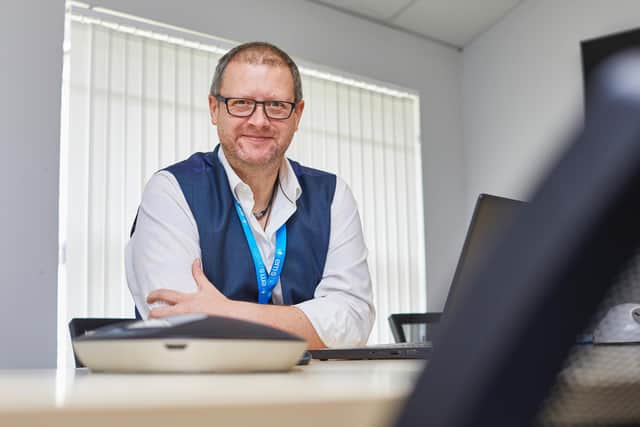Why it's important to stay engaged with your employees on mental health


Mark Sayer is an IT developer at Leeds-based health tech firm Emis. He walked out of the job around four years ago and was diagnosed with clinical depression.
Since then he has returned to the business, where he has worked for 26 years, and become one of 21 mental health first aiders there.
Advertisement
Hide AdAdvertisement
Hide AdSpeaking to The Yorkshire Post, Mr Sayer says that it’s even harder to spot signs that someone is struggling with mental health issues due to the shift towards virtual working.


He said: “In the virtual world you may find that someone has all of a sudden stopped putting their camera on in a Teams call or they sit there on mute for the entire meeting unless they are directly addressed in a question.
“Or people just don’t turn up to meetings. Those are probably going to be the key signs for the virtual world at the moment.”
Mr Sayer believes that anxiety has generally increased over lockdown as people are faced with uncertainty.
Advertisement
Hide AdAdvertisement
Hide AdRelating to his own depression, the 50-year-old’s advice to others struggling with mental health is to talk to people.
He said: “The way I would advise people is you’re never on your own. If you feel depressed or anxious in any way, there are lots of other people that feel this and live this on a daily basis.
“No-one is going to be judgemental towards you if you reach out and ask for a chat.”
Mr Sayer’s depression started around 20 years ago and gradually it built up.
Advertisement
Hide AdAdvertisement
Hide Ad“Initially, it was mood swings and then the darker phases that would then last a number of days,” he says.
Mr Sayer added: “At that point I didn’t know what it was. I just thought I was being moody.”
However, things came to a head around four years ago when he walked out of his workplace.
“It just got to the point where I had enough being around people and dealing with things,” he said. “I just packed up my laptop and things and just walked out of the door.”
Advertisement
Hide AdAdvertisement
Hide AdOn the drive home, he rang his GP and was diagnosed with clinical depression. Mr Sayer wishes he had spoken to someone about it sooner.
He said: “One of the biggest things about depression is you want to be on your own and don’t want to talk to anyone.
“Whereas one of the initial steps towards helping yourself as a person is to just reach out and have a chat with someone. It doesn’t cure anything but it makes you feel better.”
Research for BIMA’s Tech Inclusivity & Diversity Report 2019 found that 52 per cent of tech workers have suffered from anxiety or depression at some point.
Advertisement
Hide AdAdvertisement
Hide AdIt also found that people working in tech are five times more depressed than the UK average.
One of the ways that tech firms can help people’s mental wellbeing is to encourage collaboration.
Mr Sayer said: “We encourage collaborative working. We’ll have multiple colleagues working together, screen sharing so you’re not isolated and working on one project on your own.
“As we’re now moving towards a working-from-home business, we’ve turned a number of our offices into collaboration hubs, where staff can come in and brainstorm together so you’re actually physically in a room with your colleagues rather than doing everything online.”
Advertisement
Hide AdAdvertisement
Hide AdEmis employs over 1,500 people. In Leeds, it has over 600 staff dotted across three sites.
A rewarding role
Mark Sayer says he is in a “really good place” right now with his mental health. He is also enjoying his role as a mental health first aider.
“It’s a great role,” Mr Sayer said. “It’s really rewarding and I think as a business we’re seeing the positives of it.”
The IT developer is less harsh on himself.
He said: “I tend not to be as hard on myself anymore. If I was going to be late somewhere I would get really stressed out but now it’s just a case of ‘if I’m late, I’m late’.
“It’s also just about finding time for yourself.
Advertisement
Hide AdAdvertisement
Hide Ad“Finding time to be with my wife and my son and just taking that time out.”
---
Support The Yorkshire Post and become a subscriber today.
Your subscription will help us to continue to bring quality news to the people of Yorkshire. In return, you'll see fewer ads on site, get free access to our app and receive exclusive members-only offers.
So, please - if you can - pay for our work. Just £5 per month is the starting point. If you think that which we are trying to achieve is worth more, you can pay us what you think we are worth. By doing so, you will be investing in something that is becoming increasingly rare. Independent journalism that cares less about right and left and more about right and wrong. Journalism you can trust.
Thank you
James Mitchinson